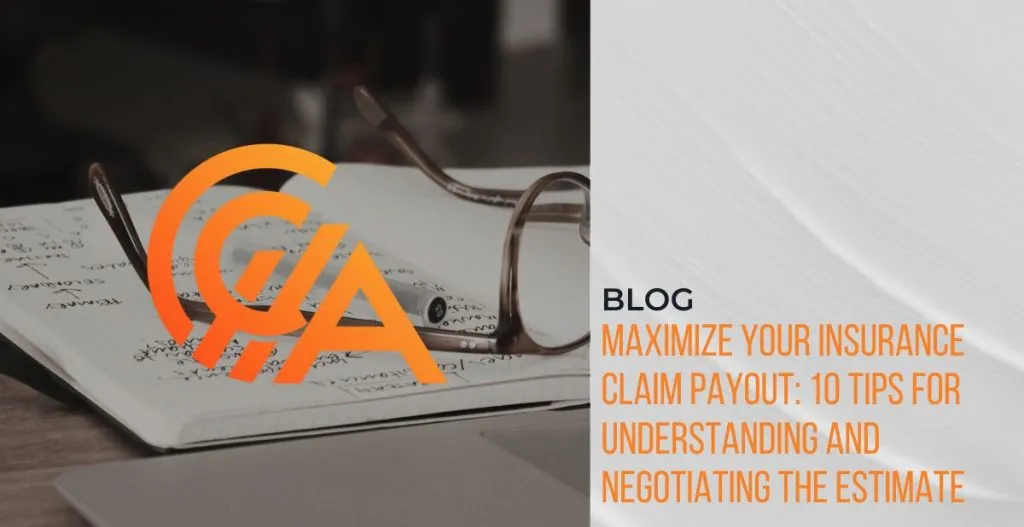To negotiate a cash settlement with an insurance company, initiate a claim as soon as possible after the incident, keep accurate records, calculate a fair settlement, send a detailed demand letter, do not accept the first offer, emphasize your points, and get everything in writing. Communicate openly with the insurance company, outline your concerns, back them up with evidence, and stay patient throughout the process.
Counter a low settlement offer by rejecting it and explaining why you deserve a higher amount. Be prepared and don’t be afraid to negotiate with the claims adjuster, as their goal is to minimize the payout. Remember, the first offer is not always the best, so it’s important to negotiate for a fair settlement.
Preparing For Negotiation
Learn how to negotiate a cash settlement with your insurance company by following these effective strategies. Communicate openly with the insurance company, provide evidence to support your claims, and be patient throughout the negotiation process to ensure you get the best settlement offer possible.
Avoid accepting the first offer without considering all your options.
Gather Evidence
Before entering into negotiations with the insurance company, it’s crucial to gather all the evidence you need to support your claim. This evidence will play a vital role in convincing the insurance company to offer you a fair settlement. Here are some key pieces of evidence you should gather:
- Photographs: Take clear, detailed photographs of the scene of the accident, any damage to your property, and any injuries you sustained.
- Police Reports: Obtain a copy of the police report if one was filed at the time of the incident.
- Medical Records: Collect all relevant medical records that document your injuries and the treatment you received.
- Witness Statements: If there were any witnesses to the accident, gather their contact information and statements.
- Receipts and Invoices: Keep track of any expenses related to your claim, such as medical bills, property repair costs, or rental car expenses.
By having a comprehensive collection of evidence, you will strengthen your position during negotiations and increase your chances of securing a fair settlement.
Calculate A Fair Settlement
It’s important to calculate a fair settlement amount before starting negotiations with the insurance company. This ensures that you have a clear understanding of the value of your claim and can advocate for the amount you deserve. Here are some crucial factors to consider when calculating a fair settlement:
- Medical Expenses: Calculate all the medical expenses you have incurred, including doctor’s visits, surgeries, medications, and therapy.
- Property Damage: Determine the cost of repairing or replacing any damaged property, such as your vehicle or personal belongings.
- Lost Wages: If the accident has caused you to miss work and lose income, calculate the amount of lost wages.
- Pain and Suffering: Assess the physical and emotional pain you have experienced as a result of the accident. This can be challenging to quantify, so consulting with a professional or using a pain and suffering calculator may be helpful.
By carefully calculating a fair settlement amount, you can enter negotiations with confidence, knowing the value of your claim.
Send A Demand Letter
Once you have gathered all the necessary evidence and calculated a fair settlement amount, it’s time to send a demand letter to the insurance company. This letter serves as an official request for a fair settlement and lays out the reasons why you believe you deserve the requested amount. Here are the key elements to include in your demand letter:
- Clear and concise description of the accident and its consequences.
- Details of your injuries, medical treatment, and any long-term effects.
- Explanation of the impact the accident has had on your daily life, including emotional distress.
- Breakdown of the damages you are claiming, including medical expenses, lost wages, property damage, and pain and suffering.
- Reference to the evidence you have gathered, such as photographs, police reports, and witness statements.
- Express your willingness to negotiate and reach a fair settlement.
- Set a deadline for the insurance company to respond to your letter.
Sending a detailed demand letter increases your chances of receiving a timely response and starting a negotiation process with the insurance company.

Credit: www.redfin.com
Negotiation Process
When it comes to negotiating a cash settlement with an insurance company, understanding the negotiation process is crucial. Initiating the negotiation, mastering the art of communication, and staying patient are key factors that contribute to a successful negotiation. Let’s delve into each of these aspects in detail:
Initiating The Negotiation
Initiating the negotiation process is the first step towards achieving a fair settlement. To start, communicate openly and honestly with the insurance company. Clearly express your concerns regarding their initial settlement offer and provide supporting evidence to back up your claims. Make sure to keep accurate records about the accident and calculate a fair settlement considering all the damages and losses you have incurred.
After gathering all the necessary information, it’s time to send a detailed demand letter to the insurance company. This letter should clearly outline your position and highlight the strengths of your case. It’s important to refrain from accepting the first offer without careful consideration. Instead, emphasize the points in your favor and request a higher settlement amount that aligns with your damages and losses.
To ensure transparency and avoid any misunderstandings, it’s crucial to get everything in writing. Document all negotiations and agreements in written form, including any counteroffers or revised settlement amounts. This will help protect your interests and provide a clear record of the negotiation process.
The Art Of Communication
Mastering the art of communication is essential during the negotiation process. Engage in open and constructive dialogue with the insurance company. Clearly express your concerns, but do so in a respectful and professional manner. Avoid becoming overly emotional or confrontational, as this can hinder the negotiation process.
Use persuasive language to present your case effectively. Highlight the factual information and evidence that supports your demand for a higher settlement amount. Be prepared to counter any points raised by the insurance company to justify a low offer. Your goal is to negotiate a settlement that adequately compensates you for your damages and losses.
Staying Patient
Negotiation can be a lengthy process, so it’s important to stay patient. Insurance companies may make low settlement offers initially with the hope that you will accept them without questioning. However, it’s essential to remember that you have the right to negotiate for a fair settlement.
Avoid accepting the first offer without due consideration. Take your time to review all aspects of the settlement offer and consult with professionals if needed. Work towards finding a middle ground that both parties can agree upon, but never settle for less than what you believe is fair.
By staying patient and persistent, you can achieve a satisfactory cash settlement with the insurance company that adequately compensates you for your damages and losses.
Counteracting Low Settlement Offers
When it comes to negotiating a cash settlement with an insurance company, one of the biggest obstacles you may encounter is a low settlement offer. Insurance companies often try to minimize their payouts, offering less than what you deserve for your claim. Fortunately, there are strategies you can employ to counteract these low settlement offers and ensure you receive the compensation you are entitled to.
Rejecting The Offer
Rejecting a low settlement offer is the first step in counteracting it. HTML tags
- Step 1: Write a letter
- Step 2: Outline your concerns
- Step 3: Back up your claims with evidence
- Step 4: Address their reasons for the low offer
By rejecting the offer and providing strong reasons for doing so, you send a clear message that you will not accept an unfair settlement amount.
Highlighting Deserving Settlement Amount
Highlighting the deserving settlement amount is crucial in negotiating with the insurance company. HTML tags
- Step 1: Provide evidence of damages and injuries
- Step 2: Show medical records and bills
- Step 3: Present repair estimates and receipts
By emphasizing the extent of your losses and the financial impact they have had on you, you can make a strong case for a higher settlement amount.
Providing Counter Reasons
Providing counter reasons is essential in challenging the insurance company’s lowball initial offer. HTML tags
- Step 1: Address their reasons for the low offer
- Step 2: Disprove their arguments with facts and evidence
- Step 3: Present alternative perspectives and expert opinions
By countering the insurance company’s reasons and providing strong counterarguments, you can weaken their position and increase the likelihood of a higher settlement.
Dealing With Insurance Claims Adjuster
When negotiating a cash settlement with an insurance company, one of the key players you’ll interact with is the insurance claims adjuster. These professionals are responsible for evaluating your claim and determining the amount of compensation you may receive. To ensure a successful negotiation, it’s essential to understand how to deal with an insurance claims adjuster effectively.
Preparing Supporting Evidence
Before engaging in negotiations with an insurance claims adjuster, it’s crucial to gather and prepare all the necessary supporting evidence for your claim. This evidence serves as proof of the damages you’ve incurred and helps strengthen your case for a higher settlement amount.
Here are some important steps to consider when preparing supporting evidence:
- Document the damages: Take detailed photographs and videos of the property damage or injuries you’ve suffered. These visual records will provide a clear depiction of the extent of your losses.
- Collect relevant documents: Gather all relevant documents, such as medical records, repair estimates, receipts, and any other evidence that supports your claim. These documents will serve as evidence of your expenses and losses.
- Obtain expert opinions: If necessary, seek expert opinions or evaluations that can further validate the extent of your damages or injuries. These expert testimonies can carry substantial weight during negotiations.
Calculating Full Settlement Amount
Accurately calculating the full settlement amount is crucial during negotiations. This amount should cover all the damages and losses you’ve incurred and provide fair compensation for your situation.
To calculate the full settlement amount, consider the following aspects:
- Evaluate property damages: Assess the costs of repairing or replacing damaged property, including any additional expenses required, such as temporary accommodation or storage.
- Assess medical costs: Calculate the medical expenses related to injuries suffered as a result of the incident. This includes current and future medical treatments, rehabilitation, medications, and therapy.
- Consider lost income: If you’ve lost income due to the incident, estimate the amount of lost wages or potential loss of future earnings. Take into account any evidence, such as medical certificates or expert opinions, to support your claim.
- Factor in pain and suffering: Calculate a reasonable amount for pain, suffering, and emotional distress experienced as a result of the incident. This can be tricky, so consulting with a legal professional may be beneficial.
Knowing Your Limits
While it’s important to strive for a fair settlement, it’s equally crucial to acknowledge and understand your limits during negotiations. This will help you avoid accepting inadequate offers or jeopardizing your chances of reaching a satisfactory agreement.
To determine your limits, consider the following:
- Consult a legal professional: Seek advice from a lawyer or legal expert who can provide insights into the typical settlement amounts for cases similar to yours.
- Research similar cases: Conduct research to understand how similar cases have been settled. This information can help you gauge what a reasonable settlement amount would be.
- Consider your financial situation: Assess your financial needs and the potential impact of a prolonged negotiation process. If the settlement offer meets your immediate needs without compromising your long-term financial stability, it may be worth considering.
By adequately preparing supporting evidence, calculating the full settlement amount, and understanding your negotiating limits, you’ll be better equipped to engage in productive discussions with an insurance claims adjuster. Remember, staying patient and persistent throughout the negotiation process can lead to a successful cash settlement.
Finalizing The Settlement
When negotiating a cash settlement with an insurance company, it is important to clearly communicate your concerns and back them up with evidence. Stay patient throughout the process and avoid accepting the first offer without careful consideration.
Receiving Cash Settlement
Once you have successfully negotiated a cash settlement with the insurance company, the next step is to receive the agreed-upon amount.
First, make sure that all the details of the settlement are clearly outlined in writing. This includes the amount of the settlement, any deductions, and the method of payment.
Contact the insurance company to confirm the payment details and ask about the estimated time of arrival for the settlement funds. It’s important to keep in mind that the timeline for receiving the settlement may vary depending on the company and the nature of the claim.
Ensure that you maintain open communication with the insurance company throughout this process. If there are any delays or issues with the payment, reach out to them to resolve the matter.
Reviewing The Settlement Offer
Before finalizing the settlement, it is crucial to carefully review the offer. Take the time to go through the settlement document and understand all its terms and conditions.
Key points to consider when reviewing a settlement offer:
- Make sure that the settlement amount is fair and reasonable based on the damages and losses you have suffered.
- Verify that the payment includes any medical expenses, property damage, and other applicable costs.
- Check for any clauses or provisions that may restrict your rights or limit future claims.
If you have any concerns or questions about the settlement offer, seek legal advice from a professional who specializes in insurance claims. They can provide guidance and help you make an informed decision.
Reading The Fine Print
Before you sign any settlement agreement, it’s important to carefully read the fine print. This step ensures that you fully understand the terms and conditions of the settlement.
Pay close attention to any clauses regarding confidentiality, release of liability, and any obligations you may have after the settlement is finalized.
Take note of any deadlines or requirements mentioned in the settlement agreement. Make sure you are aware of your responsibilities and that you can fulfill them within the specified timeframe.
If there are any sections of the settlement agreement that are unclear or confusing, don’t hesitate to seek legal advice. Understanding the terms and conditions fully will help you make an informed decision and protect your rights.

Credit: www.sutliffstout.com

Credit: www.linkedin.com
Frequently Asked Questions Of How To Negotiate A Cash Settlement With Insurance Company
How Do I Ask For More Money In My Insurance Settlement?
To ask for more money in your insurance settlement: 1. Initiate a claim immediately after the accident. 2. Keep accurate records of the accident. 3. Calculate a fair settlement amount. 4. Send a detailed demand letter to the insurance company. 5.
Don’t accept the first offer. 6. Highlight your strong points. 7. Get everything in writing. Remember, negotiation may take time. Communicate clearly and be patient.
How Do You Negotiate A Cash Settlement?
To negotiate a cash settlement, communicate openly with the insurance company and provide evidence to support your concerns about their offer. Be patient and avoid accepting the first offer without considering it carefully. If the offer is too low, reject it and counter with reasons why you deserve a higher amount.
Negotiating with the adjuster is also important, so be prepared and stand your ground.
How Do You Counter A Low Settlement Offer?
To counter a low settlement offer, consult with your legal representative to draft a letter stating your rejection and reasons for a higher settlement. Highlight your evidence and address the reasons given for the initial lowball offer. Negotiate patiently and don’t accept the first offer without careful consideration.
Can You Argue With An Insurance Claims Adjuster?
Yes, you can argue with an insurance claims adjuster. It’s important to be well-prepared with evidence and not be afraid to negotiate and stand your ground. The goal is to get a fair settlement that covers your damages.
Conclusion
When negotiating a cash settlement with an insurance company, remember that patience and effective communication are key. Clearly outline your concerns and provide evidence to support your claims. Avoid accepting the first offer without careful consideration and don’t be afraid to counter with a higher settlement amount.
Stay well-prepared with supporting documentation and get everything in writing to protect your interests. By following these tips, you can successfully negotiate a fair cash settlement with your insurance company.
- How Much Does a Ford 9N Tractor Weigh - May 20, 2024
- How Many of My Exact Car were Made: Uncovering the Rarity - May 20, 2024
- How to Find Out What Someone Drives: Discover the Truth - May 20, 2024


